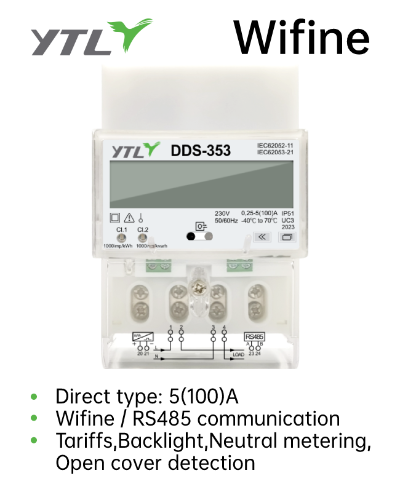Digital electrical meters, also known as digital energy meters, are advanced devices used to measure and monitor the consumption of electricity in residential, commercial, and industrial settings. Unlike traditional analog meters, digital electrical meters provide more accurate readings and offer a range of benefits that make them a popular choice for utility companies and consumers alike.
One of the key advantages of digital electrical meters is their precision in measuring electricity usage. These meters utilize cutting-edge technology to capture and record electricity consumption with a high level of accuracy, ensuring that customers are billed correctly for the energy they use. This accuracy is particularly important in situations where energy usage needs to be closely monitored, such as in industrial facilities or data centers.
In addition to their accuracy, digital electrical meters offer enhanced functionality and data management capabilities. Many digital meters are equipped with features such as real-time monitoring, remote reading, and data logging, allowing both consumers and utility companies to access detailed information about energy usage. This not only helps customers understand their electricity consumption patterns, but also enables utility providers to optimize their operations and plan for future energy needs.
Furthermore, digital electrical meters are designed to be more reliable and durable than their analog counterparts. With no moving parts, digital meters are less susceptible to wear and tear, resulting in fewer maintenance requirements and a longer lifespan. This reliability is crucial for ensuring consistent and uninterrupted energy measurement, especially in critical applications where downtime is not an option.
The deployment of digital electrical meters has also contributed to the advancement of smart grid technology. By integrating digital meters into a smart grid infrastructure, utility companies can improve the efficiency and reliability of their electrical distribution systems. Smart meters enable two-way communication between consumers and utility providers, facilitating dynamic pricing, demand response programs, and the seamless integration of renewable energy sources.
It is worth noting that the widespread adoption of digital electrical meters has raised some concerns about data privacy and security. As these meters collect and transmit detailed information about energy usage, there is a need to implement robust cybersecurity measures to protect sensitive data and ensure the integrity of the metering infrastructure.
In conclusion, digital electrical meters are a fundamental component of modern energy management systems, offering unparalleled precision, functionality, and reliability. As the demand for efficient and sustainable energy solutions continues to grow, digital meters will play a crucial role in shaping the future of electricity measurement and consumption. With ongoing advancements in technology, digital electrical meters are poised to further improve energy efficiency, empower consumers, and support the transition to a more resilient and sustainable energy ecosystem.

 English
English 简体中文
简体中文








.jpg?imageView2/2/w/500/h/500/format/png/q/100)






